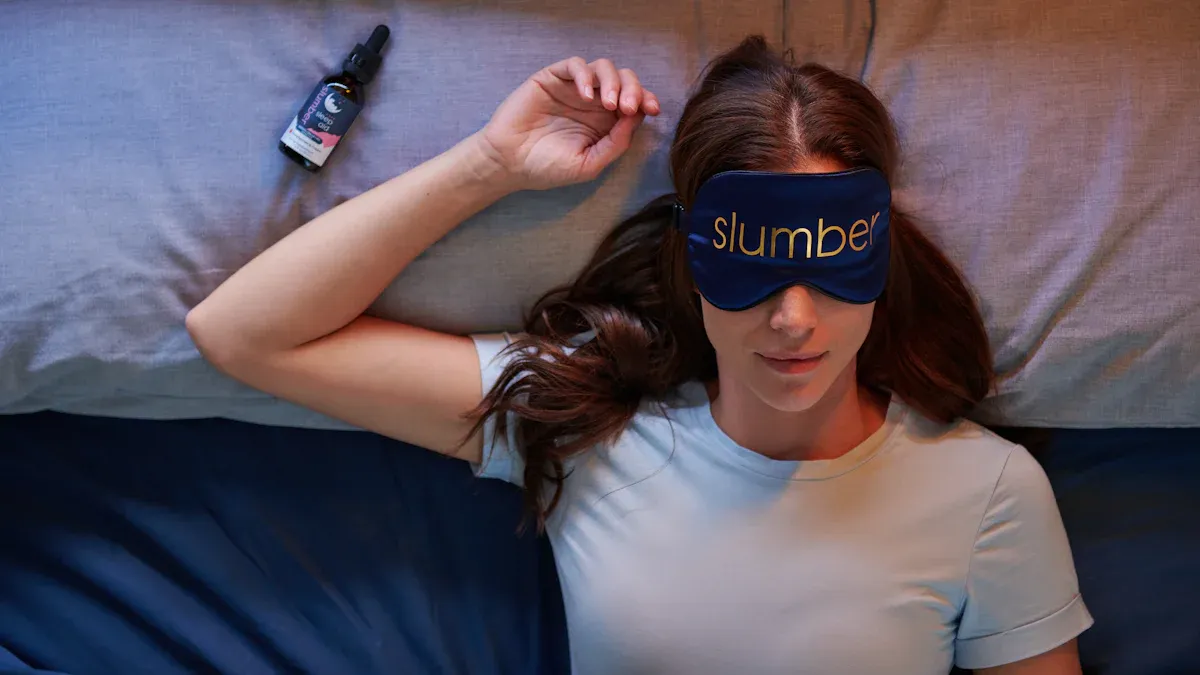Top Sleeping Aid Supplements in 2025 Melatonin vs Natural Options

In 2025, many people use sleeping aid supplements to fix sleep problems. Melatonin is still very popular, with over 5 million adults and 4 million kids in the U.S. using it often. However, natural options like valerian root and magnesium are becoming popular too, as they help improve sleep without fake ingredients. Choosing the right sleeping aid supplement depends on your specific needs. Apps like Eathy can check supplement ingredients, helping you find safe and effective options for better sleep.
Key Takeaways
- Melatonin is a common sleep aid that helps control sleep patterns. It can help you sleep faster and improve how well you rest. It’s useful for jet lag or trouble sleeping.
- Natural options like magnesium and CBD can calm you and lower stress. These are good for long-term use, especially if anxiety affects your sleep.
- The Eathy app helps you find safe sleep supplements. It checks ingredients to make sure you pick good products that fit your needs.
- Using melatonin with magnesium or CBD may improve sleep. Each works differently, so combining them might give better results.
- Good sleep habits matter. Stick to a regular sleep schedule, relax before bed, and avoid screens to sleep better overall.
Understanding Melatonin

How Melatonin Helps You Sleep
Melatonin controls when you sleep and wake up. This hormone is made in your brain by the pineal gland. It tells your body when it’s time to rest. Dr. Miner says melatonin levels go up at night, peak while you sleep, and drop in the morning. This helps you fall asleep and stay asleep.
If falling asleep is hard for you, you might ask, "how does melatonin work?" Melatonin supplements copy the natural hormone to help you sleep. A study of 19 trials showed melatonin helped people fall asleep 7 minutes faster. It also added 8 more minutes of sleep compared to a fake pill. While the changes are small, they can help if your sleep is off.
Why Melatonin is Good for Insomnia
Melatonin can help if you have insomnia. If you can’t fall or stay asleep, melatonin might help you rest better. Studies show melatonin improves sleep quality but isn’t as strong as some medicines. For people with insomnia, it’s a safer, natural choice.
Melatonin also helps with jet lag or working night shifts. It resets your body clock so you can adjust to new sleep times. This makes it useful for different sleep problems.
Side Effects of Melatonin
Melatonin is mostly safe, but it can have side effects. These include:
- Feeling sleepy during the day
- Headaches
- Feeling dizzy
- Upset stomach
- Mood swings
These side effects are usually mild and don’t last long. It’s important to take the right amount. Apps like Eathy can check melatonin supplements to make sure they’re safe. This is helpful if you use melatonin with other sleep aids.
Why Melatonin is Still a Favorite Sleep Aid
Melatonin stays popular because it works and is easy to get. It copies the natural hormone your body makes to control sleep. This makes it a simple choice for fixing sleep problems.
More people are using melatonin every year. In 1999, only 0.4% of people used it. By 2018, this grew to 2.1%, with sales hitting $2.84 billion. Experts think it will keep growing by 14.9% each year until 2025. These numbers show melatonin is still a top pick over other sleep aids.
Melatonin is helpful for many sleep problems. It can ease insomnia, jet lag, and trouble from working night shifts. Unlike strong medicines, melatonin is natural and has fewer risks. Many people say it helps them sleep better without bad side effects.
Melatonin is also easy to use. It comes as tablets, gummies, or liquids, so it fits into any routine. Apps like Eathy can check melatonin products to make sure they are safe and work well.
Even with its benefits, using melatonin correctly is important. Taking the right amount at the right time helps it work best. This careful use keeps melatonin a top choice for better sleep.
Exploring Natural Alternatives to Melatonin

Magnesium for Relaxation and Sleep
Magnesium is often called the "relaxation mineral." It helps your body relax and get ready for sleep. This mineral calms your muscles and nervous system. It lowers calcium in muscles, making them less tight. Magnesium also boosts GABA, a brain chemical that slows down activity. This makes it easier to fall asleep.
Magnesium may also lower stress by reducing cortisol, a stress hormone. Not everyone gets the same results, but many find it helpful. Experts suggest taking 100 to 200 mg before bed. If you ask, "Does magnesium help with sleep?" the answer is yes, but it depends on the person.
To pick a good magnesium supplement, try using the Eathy app. It checks ingredients to help you find safe products.
CBD as a Natural Sleep Aid
CBD comes from hemp plants and is a natural sleep helper. Studies show CBD can improve sleep quality and help you sleep longer. Higher doses, like 40 to 160 mg daily, work best. One study found 300 mg of CBD improved how people felt about their sleep.
CBD works with your body's endocannabinoid system. This system controls sleep, mood, and stress. Unlike melatonin, CBD doesn’t directly change your sleep cycle. Instead, it helps you relax and feel less anxious, making sleep easier.
If you want to use CBD with melatonin, talk to a doctor first. The Eathy app can also check CBD products for safety and quality.
Valerian Root for Insomnia Relief
Valerian root has been used for years to help with sleep and anxiety. It calms your nervous system, helping you relax and fall asleep faster. Studies show it improves sleep, especially for mild insomnia. It works gently, so many people like it as a natural option.
Valerian root and melatonin work differently. Melatonin fixes your sleep cycle, while valerian root calms your mind and body. This makes valerian root good if stress keeps you awake. Some people may feel dizzy or have an upset stomach after using it.
When comparing valerian root and melatonin, both have their own benefits. Use the Eathy app to check valerian root supplements for safety.
Ashwagandha for Stress and Better Sleep
Ashwagandha is a natural herb that helps with stress. Stress can mess up your sleep, making it hard to relax. Ashwagandha lowers cortisol, the stress hormone, helping you feel calm. This makes it easier to rest and sleep well.
Studies show Ashwagandha works for stress-related sleep problems. For example:
If stress stops you from sleeping, Ashwagandha might help. It comes as capsules, powders, or teas. Use the Eathy app to check products for safety and quality.
L-Theanine for Relaxing the Mind
L-Theanine is an amino acid found in green tea. It helps you relax without making you sleepy. If you have anxiety or racing thoughts, it can help calm your mind.
Research shows L-Theanine helps with relaxation:
- It improves sleep and calmness, especially for anxious people.
- Studies say it lowers stress by reducing certain stress markers.
- A 2021 trial found it boosts alpha brainwaves, linked to relaxation.
- A 2024 review showed it helps with anxiety and depression symptoms.
Take L-Theanine 30 to 60 minutes before bed for best results. It’s available in capsules or mixed with other sleep aids. If using it with melatonin, ask a doctor first. The Eathy app can also check if L-Theanine products are safe.
Comparing Melatonin and Natural Alternatives
How They Help Different Sleep Problems
Picking between melatonin and other sleep aids depends on your needs. Melatonin is best for fixing sleep schedules, like jet lag or late sleeping. It helps your body know when to sleep and wake up. Studies show it can help you fall asleep 7 minutes faster and sleep better.
Magnesium works differently. It helps you relax by calming muscles and lowering stress. If anxiety makes it hard to sleep, magnesium might work better than melatonin. Melatonin fixes your sleep cycle, but magnesium helps you feel calm and sleep deeply.
For stress-related sleep problems, using CBD with melatonin might help. CBD calms you down, while melatonin fixes your sleep schedule. Always ask a doctor before mixing supplements. The Eathy app can check if these products are safe.
Are These Supplements Safe?
Safety matters when picking sleep aids. Melatonin is safe for short-term use but can cause mild issues. These include headaches, dizziness, or feeling sleepy during the day. These problems don’t last long and are less serious than medicine side effects. Some melatonin products may have uneven amounts, so use the Eathy app to find good ones.
Magnesium and CBD are also safe for most people. Magnesium rarely causes problems, but too much can upset your stomach. CBD is usually fine but might make you tired or change your appetite. Start with small doses to avoid side effects.
Using Them Long-Term: Melatonin vs Natural Choices
Using melatonin for a long time might not be a good idea. Experts say it could stop your body from making its own melatonin. Research on long-term use is limited, so it’s better for short-term fixes like jet lag. Dr. Seema Bonney says melatonin is a hormone, and too much might mess up your hormones.
Natural options like magnesium and CBD might be better for long-term use. Magnesium helps you relax without changing how your body works. CBD lowers stress, which can improve sleep over time. These choices may offer more benefits and fewer risks for regular use.
Think about your sleep needs before choosing. The Eathy app can check ingredients in melatonin or natural supplements to help you pick safe and effective options.
Best Sleep Aids for Insomnia, Jet Lag, and Anxiety
Picking the right sleep aid depends on your sleep problems. Whether it’s insomnia, jet lag, or anxiety, knowing how supplements work helps you choose wisely.
Comparing Sleep Aids for Different Needs
Here’s a table showing top sleep aids and their benefits:
Melatonin is great for fixing your sleep schedule. It’s helpful for jet lag or changing sleep times. Magnesium helps you relax and sleep better. If anxiety keeps you awake, magnesium can calm your mind and stop early wake-ups. For bad insomnia, using melatonin and magnesium together may give deeper sleep.
Choosing What’s Best for You
Think about your sleep needs before picking a supplement. If jet lag is your problem, melatonin might work best. For anxiety-related sleep trouble, magnesium is a natural way to relax. If insomnia continues, combining both could be the best choice.
To stay safe, use the Eathy app to check supplement ingredients. This app helps you find good melatonin, magnesium, or other sleep aids. It’s useful for picking safe products that match your needs.
Combining Melatonin with Natural Alternatives
Why Mixing Sleep Aids Can Help
Using melatonin with natural sleep aids can improve your sleep. Each one works in a unique way, and together, they may be stronger. For example:
- Melatonin helps your body know when to sleep and wake up.
- Magnesium relaxes muscles and calms your nerves for better rest.
- Together, they may improve mood and give deeper sleep.
A study on scutellaria and saffron found combining supplements can boost mood and lower anxiety. Since mood affects sleep, this mix might help you sleep better too. If stress or anxiety keeps you awake, try CBD with melatonin. CBD helps you relax, while melatonin fixes your sleep schedule.
To stay safe, use the Eathy app to check supplement ingredients. This app helps you find good products, especially when mixing melatonin with herbs or other aids.
Things to Watch Out for When Mixing Supplements
Mixing sleep aids can help, but be careful of side effects. Combining melatonin with others might cause dizziness, upset stomach, or feeling too sleepy. For example, too much magnesium can upset your stomach, and CBD might make you very tired.
Using melatonin for a long time might stop your body from making its own. Mixing it with other aids could make this worse. Start with small amounts and see how your body reacts.
Talk to a doctor before using mixes like CBD and melatonin. They can tell you the right amount and check for medicine interactions. The Eathy app can also check if your supplements are safe and meet your needs without extra risks.
Choosing the Right Sleeping Aid Supplement
Knowing Your Sleep Problems
To pick the best sleep aid, know your sleep issues. Do you have trouble sleeping because of stress or a messy schedule? Finding the cause helps you choose the right option. For example, melatonin is great for fixing sleep cycles, like with jet lag. But magnesium or CBD can help you relax and sleep better by easing stress.
Think about your health and daily habits too. If you take medicine or have health problems, some supplements might not work for you. For instance, melatonin can affect blood thinners or antidepressants. Always check what’s in the product you want to use. The Eathy app can scan supplements to make sure they’re safe and don’t have bad ingredients.
Using the Right Dose and Time
Taking the right amount at the right time is important. Melatonin doses are usually between 0.5 and 5 mg. Start small and increase if needed. If you use melatonin with CBD, take melatonin first since it works slower. For magnesium, 100-200 mg before bed can relax your body and mind.
When you take it also matters. Eat melatonin or CBD gummies 30-60 minutes before bed to fall asleep faster. Magnesium might take weeks to fully work. Change your routine based on how your body reacts. If you’re unsure about doses, ask a doctor for advice.
Asking a Doctor for Advice
Before trying any sleep aid, talk to a doctor. This is very important if you have health problems or take other medicines. Supplements like melatonin or L-theanine can mix badly with some drugs. A doctor, pharmacist, or dietitian can help you pick a safe product.
Also, look for supplements approved by trusted groups like NSF or U.S. Pharmacopeia. These groups make sure the product has what it says on the label. The Eathy app can also check if supplements with herbs or melatonin are safe and good quality.
By asking experts and using tools like Eathy, you can choose the best way to sleep better and improve your rest.
Thinking About Your Lifestyle and Health
Your daily habits and health affect your sleep aid choice. Things like what you eat, exercise, and routines can change how supplements work. Melatonin helps control your sleep schedule, making it better for fixing sleep issues than magnesium. But your habits can either help or hurt these supplements' effects.
Some habits can make sleep harder:
- Eating big meals, caffeine, or alcohol before bed can harm sleep.
- Sugary and processed foods might mess up your sleep cycle.
- Regular exercise helps you sleep better and feel more rested.
To make your room better for sleep, try these tips:
- Keep your room cool, dark, and quiet.
- Stop using screens and bright lights before bed.
- Avoid caffeine and alcohol hours before sleeping.
Your health also matters when picking a sleep aid. If stress keeps you awake, Ashwagandha or L-Theanine may help more than melatonin. For tight muscles or anxiety, magnesium might be a better choice. Pay attention to how your body reacts to supplements. Use the Eathy app to check if herbal or melatonin products are safe and good

